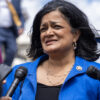In today’s Wall Street Journal, Kimberly Strassel details what exactly the labor movement is expecting from Democrats in return for their nearly $1 billion in election spending tis cycle. On the big labor wish list:
- a rewrite of NAFTA and an end to more trade deals
- new union only jobs
- a boost to unemployment insurance
- penalties for companies that hire overseas talent
- the outlaw of the secret ballot in union organizing elections
- legislation to make union officials the exclusive bargaining agent for mot police, fire, and rescue personnel
- the elimination of section 14(b) of Taft-Hartley which would gut all stat “right to work” laws
Why are these moves such a disaster for our economy. Heritage’s James Shrek explains:
The premise of collective bargaining is that by representing all employees a union can negotiate a better collective contract than each worker could get through individual negotiations. But because the union negotiates collectively, the same contract covers every worker, regardless of his or her productivity or effort. … In the manufacturing economy of the 1930s, this worked reasonably well. An employee’s unique talents and skills made little difference on the assembly line. … In today’s knowledge economy, however, collective representation makes little sense.
Employers now want employees with individual insights and abilities. The fastest-growing occupations over the past quarter-century have been professional, technical, and managerial in nature. The jobs of the future include Web designers, interior decorators, and public-relations specialists, among others. These jobs depend on the creativity and skills of individual employees. Few workers today want a one-size-fits-all contract that ignores what they individually bring to the bargaining table. Union-negotiated, seniority-based promotions and raises feel like chains to workers who want to get ahead.
The one sector where unions remain relevant is the government. Almost half of all union members now work in the public sector. The typical union member today works for the DMV, not on the assembly line. Unions fit more comfortably into government workplaces than the private sector. Government employees are used to bureaucracy that does little to reward individual initiative. And the government faces no competition.



























